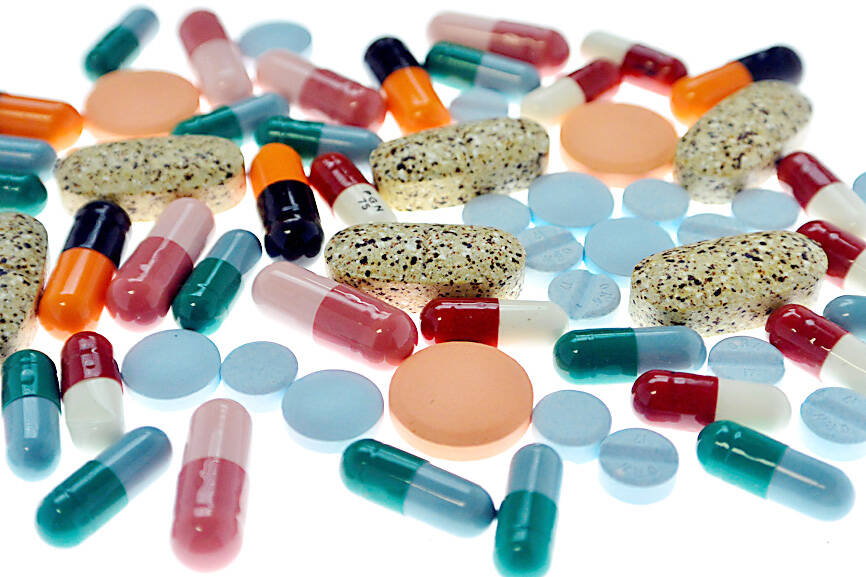Lotus Pharmaceutical Co (美時化學製藥) has received approval from Japan’s Pharmaceuticals and Medical Devices Agency for its generic version of blood cancer drug Revlimid (lenalidomide), boosting its shares by as much as 3.54 percent in early Taipei trading yesterday.
The approval was for 2.5mg and 5mg capsules of lenalidomide, which it jointly developed with Japan’s Fuji Pharma Corp, Lotus Pharmaceutical said in a regulatory filing on Tuesday.
Lotus Pharmaceutical was responsible for developing the lenalidomide formula — the company’s first high-value generic product in Japan, while Fuji Pharma ran local bioequivalence studies of the drug.

Photo: Reuters
With the approval, Lotus Pharmaceutical is to supply the finished product to Fuji Pharma for commercialization in Japan. The companies expect to launch the product in Japan this year.
Sales of Revlimid in Japan totaled about US$282 million last year, Lotus Pharmaceutical said, citing data from life sciences researcher Iqvia Institute.
As of the second quarter, only Osaka, Japan-based Sawai Pharmaceutical Co had obtained agency approval for lenalidomide, but its generic product has not yet been marketed in the Japanese market, Lotus Pharmaceutical said.
“Lotus and Fuji are among the first to market their product in Japan and gain a good market share there,” Capital Investment Management Corp (群益投顧) said in a note yesterday. “Lotus received 16 approvals for its generic products worldwide in the second quarter, which is a remarkable achievement and will gradually contribute to its revenue and royalty income in the future.”
Lotus Pharmaceutical shares surged in early morning trading yesterday before retreating to close up 1.71 percent at NT$268.
Capital Investment gave Lotus Pharmaceutical a “buy” rating with a 12-month target price of NT$295.
Lotus Pharma’s net profit more than tripled to NT$1.27 billion (US$39.82 million) in the second quarter, up 286 percent from NT$327.67 million in the same period last year, the company said on Tuesday.
That translated into earnings per share (EPS) of NT$4.85, the best second-quarter performance in its history.
In the first half of the year, EPS totaled NT$9.43, up 217 percent year-on-year, it said.
Lotus Pharma’s cumulative revenue in the first seven months totaled NT$11.25 billion, up 58.16 percent from the same period last year, company data showed.
With better business prospects, the company projected annual revenue growth of 13 to 15 percent for this year, higher than its previous estimate of 7 to 10 percent, while gross margin is expected to reach 55 percent, compared with 50 percent in its earlier forecast.

Sweeping policy changes under US Secretary of Health and Human Services Robert F. Kennedy Jr are having a chilling effect on vaccine makers as anti-vaccine rhetoric has turned into concrete changes in inoculation schedules and recommendations, investors and executives said. The administration of US President Donald Trump has in the past year upended vaccine recommendations, with the country last month ending its longstanding guidance that all children receive inoculations against flu, hepatitis A and other diseases. The unprecedented changes have led to diminished vaccine usage, hurt the investment case for some biotechs, and created a drag that would likely dent revenues and

Global semiconductor stocks advanced yesterday, as comments by Nvidia Corp chief executive officer Jensen Huang (黃仁勳) at Davos, Switzerland, helped reinforce investor enthusiasm for artificial intelligence (AI). Samsung Electronics Co gained as much as 5 percent to an all-time high, helping drive South Korea’s benchmark KOSPI above 5,000 for the first time. That came after the Philadelphia Semiconductor Index rose more than 3 percent to a fresh record on Wednesday, with a boost from Nvidia. The gains came amid broad risk-on trade after US President Donald Trump withdrew his threat of tariffs on some European nations over backing for Greenland. Huang further

Nvidia Corp’s GB300 platform is expected to account for 70 to 80 percent of global artificial intelligence (AI) server rack shipments this year, while adoption of its next-generation Vera Rubin 200 platform is to gradually gain momentum after the third quarter of the year, TrendForce Corp (集邦科技) said. Servers based on Nvidia’s GB300 chips entered mass production last quarter and they are expected to become the mainstay models for Taiwanese server manufacturers this year, Trendforce analyst Frank Kung (龔明德) said in an interview. This year is expected to be a breakout year for AI servers based on a variety of chips, as

HSBC Bank Taiwan Ltd (匯豐台灣商銀) and the Taiwan High Prosecutors Office recently signed a memorandum of understanding (MOU) to enhance cooperation on the suspicious transaction analysis mechanism. This landmark agreement makes HSBC the first foreign bank in Taiwan to establish such a partnership with the High Prosecutors Office, underscoring its commitment to active anti-fraud initiatives, financial inclusion, and the “Treating Customers Fairly” principle. Through this deep public-private collaboration, both parties aim to co-create a secure financial ecosystem via early warning detection and precise fraud prevention technologies. At the signing ceremony, HSBC Taiwan CEO and head of banking Adam Chen (陳志堅)